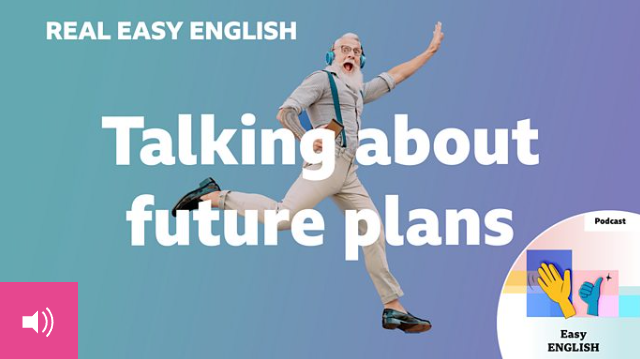Introduction
Neil and Beth have a real conversation in easy English about their plans and dreams. Learn to talk about what you want to do in the future
Vocabulary
goals
things you want to do or complete
Language tip:
Use the first conditional with when to talk about your future plans
- When my children leave home, I will play more music.
Use the first conditional with if to talk about future possibilities
- If I have the time, I will learn a new language.
Transcript
Neil
Hello and welcome to Real Easy English, the podcast where we have real conversations in easy English to help you learn. I’m Neil.
Beth
And I’m Beth. Go to our website to find a script for this episode to read along as well as a worksheet with questions on the programme.
Neil
Hello, Beth. How are you doing today?
Beth
I am very well, thank you, Neil. How are you doing?
Neil
I’m pretty good. What are we talking about today?
Beth
Well, today we are talking about our plans for the future.
Neil
So, Beth, do you like to make plans for the future?
Beth
No. I don’t like to make lots of plans, but I think it’s good to have some plans. What about you?
Neil
Yes, I have, let’s say, dreams about the future but not really plans. So things I’d like to do, maybe, in the next few years.
Beth
OK, well, I am interested to hear about your dreams. So what are your plans for the future?
Neil
Well, in the next few years, my kids will probably leave home because they’re growing up and so I’ll have a lot more time and I would like to do things I don’t do very much now. So when they leave home, I’ll spend more time going for walks in the countryside or playing music or cooking nice meals.
Beth
OK. That sounds really good. Yeah, good plans.
Neil
How about you, Beth? Do you have any goals in your life?
Beth
Well, there’s a few things that I want to do. So, for example, if I can, I want to move to a bigger house. Hopefully, if I can, I will move to the countryside because at the moment I live in a place where there are quite a few other houses, but I would really like to be out with more fresh air and places to go walking more easily.
Is there anything, Neil, that you have always wanted to do but you haven’t done yet? Like travel somewhere or do something crazy like skydiving.
Neil
Yes. There are always interesting places in the world to visit that I haven’t visited so far. I think also I would really like to get very, very good at a foreign language.
Beth
OK. That is a good goal.
Neil
Because at the moment, I can speak bits of language, but nothing really impressive.
Beth
Yeah, OK. Yeah, I think I have, yeah, similar goals. If I have the time, I’ll travel to some other countries and practise speaking different languages a bit better than I can do at the moment. But it’s difficult with time and money. Travelling is expensive, so we’ll see.
One day, Neil, we will both be retired. Have you got any thoughts on what you want to do when you’re retired? I know it’s not yet.
Neil
No, but it’s a bit closer for me than you! It’s difficult to think what I would like to do with all that free time, but I think it’s important to have a plan rather than just sit on the sofa watching TV all day.
Beth
You’d better start thinking then.
Neil
Let’s recap the language we used during our conversation.
We had goals, things you want to do or complete.
Beth
And we talked about future plans using the first conditional with when. For example, Neil, when your children leave home, you’ll play more music and go on walks.
Neil
And we used the first conditional using if to talk about future possibilities.
Beth
Yes, I said that if I can, I will move to a bigger house.
Neil
That’s it for this episode. Remember, there’s lots more to help you with your English on our website. Try our video series, The London to Edinburgh Challenge, where you can practise easy English with an exciting race. Visit bbclearningenglish.com to find all of the episodes.
Beth
Next time, we’ll talk about television and the things we like to watch.
Neil
Goodbye.
Beth
Bye.
